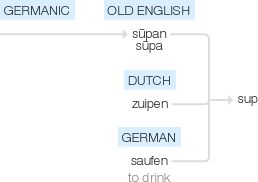Sup
Old English sūpan (verb), sūpa (noun), of Germanic origin; related to Dutch zuipen, German saufen ‘to drink’.
wiktionary
From Middle English soupen, from Old English sūpan(“to sip, drink, taste”), from Proto-Germanic *sūpaną (compare Dutch zuipen(“to drink, tipple, booze”), German saufen(“to drink, booze”), Swedish supa(“to drink, swallow”)), from Proto-Indo-European *sub-, compare Sanskrit सूप(sū́pa, “soup, broth”), from *sewe(“to take liquid”). More at suck.
From Middle English soupen, suppen, Anglo-Norman super, from supe, soupe. More at soup.
Aphetic form of what's up(“how are you doing?”)
From s- + up.
First syllable of superintendent.
First syllable of superior
etymonline
sup (v.1)
"eat the evening meal," c. 1300, from Old French super, soper "dine, sup, dip bread in soup or wine, sop up" (Modern French souper), which probably is from soupe "broth" (see soup), until recently still the traditional evening meal of French workers.
sup (v.2)
"to sip, to take into the mouth with the lips," Old English supan (West Saxon), suppan, supian (Northumbrian) "to sip, taste, drink, swallow" (strong verb, past tense seap, past participle sopen), from Proto-Germanic *supanan (source also of Old Norse supa "to sip, drink," Middle Low German supen, Dutch zuipen "to drink, tipple," Old High German sufan, German saufen "to drink, booze"), from PIE *sub-, possibly an extended form of root *seue- (2) "to take liquid" (source also of Sanskrit sunoti "presses out juice," soma; Avestan haoma, Persian hom "juice;" Greek huetos "rain," huein "to rain;" Latin sugere "to suck," succus "juice, sap;" Lithuanian sula "flowing sap;" Old Church Slavonic soku "sap," susati "suck;" Middle Irish suth "sap;" Old English seaw "sap").
